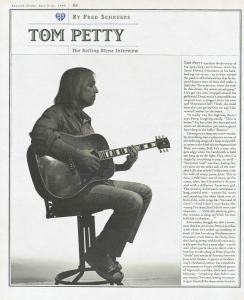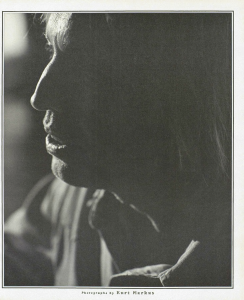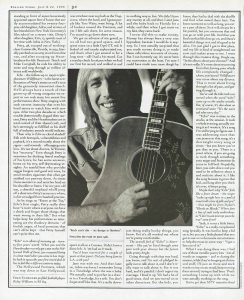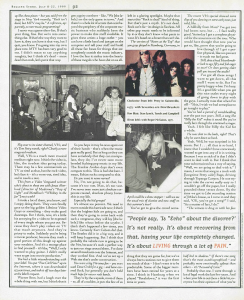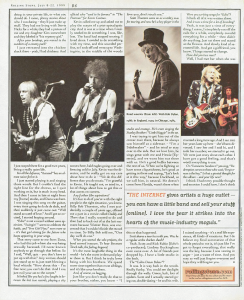Tom Petty: The Rolling Stone Interview
By Fred Schruers
Rolling Stone #816 - July 8, 1999
Tom Petty stands in the driveway of his sprawling ranch house, with the Santa Monica Mountains at his back, looking out to sea -- or at least toward the patches of luminescence that lie beyond distant rows of trees and under a dark sky. "Around now, when the traffic dies down, the waves sound great." He's got one arm wrapped around his girlfriend, Dana, and it's impossible not to quote him a snippet from his own 1976 "American Girl": "Yeah, she could hear the cars go by/Out on 441/Like waves/Crashin' on the beach..."
"It really was the highway then," says Petty, laughing easily. "This is better." He lets a fist dive forward and utters an illustrative percussive grunt from deep in the belly: "Boooom."
Closing out a long interview session by stumbling into a reference to one of the defining songs of a long and prolific career is the kind of convergence that Petty can enjoy. Still, he's a man who gets edgy when his handiwork is held too long up to the light. Plus, there's a slightly troubling irony, as well -- American girl was then, during Petty's time on the other side of the rumpled hills that enfold Hollywood, with his wife of many years, Jane. This is now, a half-hour out of town up the coast, after last December's divorce, with a different American girl. The territory in between constitutes a long, painful trek -- witness his warm and searching but often bleak new album, Echo, with songs like "Accused of Love": "And I don't even know the wrong I've done/And I don't even care anymore...Well the attorney grins, the witness is drug in/With his face half-hid in shadow..."
Echo evokes struggle but also a sweetness that lets you know Petty is just fine with where he's ended up: standing in front of the low-slung Mediterranean mansion with Dana. At thirty-five, she's lanky, pretty, with lively eyes and a ready grin that has a zany edge -- a good start when you're about to climb onto a tour bus to ride along as Petty plays the "sheds" and arenas of America between June and October. A glance at the driveway's checkered pattern has turned the conversation to Petty's childhood games of hopscotch, marbles, darts, and mumbletypeg -- "anything that didn't cause any money," he notes, letting his sarcastic grin forestall the observation that he's standing in front of 10,000 luxuriously appointed square feet of house that easily accommodated his twenty-four-year-old daughter, Adria, and sixteen of her friends from New York University's film school on a recent visit. (Petty's other daughter, Kim, spends most of her time with Adria in New York.)
Petty, 48, escaped out of working-class Gainesville, Florida, in 1974, literally perched on an amp in an Econoline van, and after scooping up Heartbreakers-for-like Benmont Tench and Mike Campbell, he rode his ability to write and song through 50 million albums sold worldwide.
Echo -- the followup to 1994's triple-platinum Wildflowers -- is the latest confirmation of Petty's status as rock's icon of the genuinely insouciant slouch. He'll always have a touch of that grown-up-all-wrong arrogance we expect in our rock stars, but recent live performances show Petty singing with such earnest intensity that even his band seems to watch him with new eyes. After two-plus decades in which trouble determinedly dogged their success, Petty and the Heartbreakers are in total control of their shared craft, and he's seemingly as fulfilled as his shelf full of industry awards would indicate.
Then why is Echo so cloud-shaded? Rife with betrayals, vulnerabilities and payback, it's a record mostly about the rigors -- and rewards -- of hanging onto love. It's not about divorce, he'll insist, but "recovery." Even though Petty is notorious for ducking literal readings of his lyrics, he has some answers, born on his wry, self-deprecating insights. An easeful host who provides veggie burgers and good red wine, he serial-smokes cigarettes that often get stubbed out partway down. At times Dana saunters in and rests her head on his shoulder to listen. Her six-year-old son, a cheerful mophead who'll jump off a chair into Petty's arms on a whim, is dirt-smudged from baseball practice.
As he sings on "Room at the Top," Echo's first single, Petty really does have "a room where everyone can have a drink and forget those things that went wrong in their life." But what helps keep his performances so interesting are the shadowy demons -- of foolish anger, of hard promises that can't all be kept -- that Petty himself can't quite shut out.
"Echo" is an album of summing up -- twenty-five years' worth. When you and the Heartbreakers recently got a star on the Hollywood Walk of Fame, you recounted living in a beat motel when you came to Los Angeles back in 1974 with your first record deal. It has to feel like a different universe today.
The Hollywood Premiere, which was way down in East Hollywood, was nowhere near as plush as the Tropicana, where the band, and I guess people like Tom Waits, were living. A lot of hookers around the Premiere, and yet I felt safe there, for some reason. I'm scared to go down there now.
We got an advance of ten grand, so we all had two grand apiece, and I spent mine on a little Opel GT, red. It leaked oil and nearly asphyxiated me, and that's what I got around in for a long time -- till I had a hit record. Got a royalty check for $6,000 when we had our first hit record, and walked in and spent it all on a Camaro. Didn't have a dime left. A '78; had an 8-track.
You'd been married for a couple of years at that point. Did you bring Jane to L.A. with you?
Jane was with me. And then later on, Adria was born; I remember living in a Travelodge when she was a baby. We actually used to put her in a drawer in a Travelodge, for a crib. You don't forget stuff like that. It's a really down-to-nothing way to live. We just didn't have any money at all, and then I sent Jane and the baby back to Florida for a while, and then when I got more on my feet, they came back.
I never did this to make money. Money has always been a very nice byproduct, because I would do it anyway. So I was actually surprised that you made money doing it, or made these ridiculous amounts of money. But I can honestly say it's never been my motivation in the least. I'm sure I could have made tons more dough by just doing really honky things, you know. But it's all worked out where we're pretty comfortable.
The overall feel of "Echo" is bittersweet -- like you've lived through some pain with your divorce but the future looks pretty bright.
Going through with that was hard, you know, and I'm sort of pledged legally not to talk about it, and I don't really want to talk about it. But it was hard, and it's painful. I don't regret my marriage. I lived it up. We had a lot of good times. And we just moved on in other directions. But the kids, you know, they had to deal with the shuffle and find what suited them best. You know someone so well, so long, you carry a part of them. So it will always be a bit painful, but you overcome that and you go on with your life. And then you find out that life does go on, and there's beautiful things in it and it's good to be alive. I'm just glad I got to that place, and my life is kind of straightened out now and makes sense to me. I went through this massive thing. People say, "Is the album about your divorce?" And it's not really. It's more about recovering from that, having your whole life completely changed -- wham, you know? Wildflowers was more about my divorce, this is more about living through a lot of pain, and getting through it.
You've said the title track was named when the word "echo" came up on the studio console. But, of course, it's also about an emotional state: "It's the same sad echo every day."
"Echo" was written in the studio, at the session. It took a whole evening, actually cutting it as I wrote it. It's a song I'm still trying to figure out. I was addressing more than one person in that song; it's a downright scary song at times -- but you know you've got that in you. There is a point where, if you are going to work through something, your anger and frustration to come to full boil. Hopefully, later you calm down and you need to be reflective about it and realistic about it. I like the song because it got to that boil, and long after you think it's over, it keeps going.
Maybe that's why "Echo" feels like a fever dream -- the singer "woke up right here in a pool of sweat with a box of pills and you" -- that might be from Dylan's "Blonde on Blonde." Where does a line of such surly ambivalence as "I don't want to tempt you to be true" come from?
Yeah, it turns a little bitter. "Echo" is a really complicated song lyrically. It was hard to keep a lid on it, but you are a little pleased that you got to use an unfortunate circumstance to help the muse in some way -- "I got a line out of it."
What I was doing there was, I had one of those metallic poetry kits -- lots of words on magnets -- and so during the session, while they're banging on drums and stuff, I'll just sit there and stuck words on my music stand, keep moving them around, trying to find lines. That's something I came up with while we were actually working on the song.
You've got these MTV statuettes lined up like chess pieces -- but you said from the stage in New York recently, "Rock isn't dead, but MTV might be." A reference, apparently, to non-music programming?
I never was a game-show fan. If that's your thing, fine. But we're into something else. If that's the way they want to have it, they can have it that way, but I quit, you know. I'm going into my own place now. MTV has been very good to me. I didn't mean to say anything naughty, but I think it's dead -- more dead than rock, let's put it that way.
Flip over to its sister channel, VH1, and it's Tom Petty month, right? Clearly a more congenial medium.
Well, VH1 is a much more musical medium right now. I think the video is, like, the tiredest idea going today. There may be a few commercials on TV as tired as that, but the rock video, let's face it -- it's a worn-out, tired idea, and it needs a rest.
This from a Video Vanguard winner who's about to shoot one with Jonas Akerlund (director of Madonna's "Ray of Light" and Metallica's "Whiskey in the Jar"] next week?
I made a lot of them, you know, and I enjoy doing them. They even finally gave us the big golden Lifetime Video Guys or something -- they make good doorstops. But I think, now, it's a little more annoying for a video to be expected of every single release you put out. Because they don't play videos on TV that much anymore. And they're pricey to make. Suddenly you're being a movie producer, because they mark a good portion of this dough up against your royalties. And it's a strange place to find yourself -- it's like, "Well, I only wanted to play guitar. I didn't really want to get into movie production.
You had a little misunderstanding with your label. You put "Free Girl Now" up on the internet, where it was downloaded 157,000 times, and took it off two days later at the label's request.
Warner Bros. had a laugh over the whole thing with me, but I think that it gets uppity out there -- like "We [the labels] are the only game in town." And there's a whole lot of artists that exist beyond the periphery of the corporate music business who suddenly have the power to make this stuff available. It gives these artists a huge outlet -- you can have a little band and just get on the computer and sell your stuff and build all these fan bases for things that are completely outside the music industry. I love the fear it strikes into the hearts of these moguls who have shit on us all.
So you hope it may be once against out of their hands -- that's when the music gets really good. But as long as they have somebody that they can manipulate, they do; I've never seen more breeded fucking pop music in my life. The Frankie Avalon days don't even compare to this. This is bad shit here. I mean, Fabian rocks compared to this.
Do you want to name names?
No, I'm not going to do that, because it's too vast. Man, it's too vast. I've never seen more just absolute corporate-created, absolute phony horseshit in my life.
Especially the kid groups?
It's almost 100 percent. We need to move outside this barricade now; I think that the brighter kids are going to, and then they're going to come back with such a vengeance, they will lay [the labels] like wheat before the scythe. I think that's happened a few times, you know. Certainly Kurt Cobain did that. The Beatles did it in a big way, and it will keep happening. But I think that probably the vehicle now is going to be the Net, because it's such a perfect way to just run rings around them. I've done several broadcasts over the Internet, and they worked fine. And we've set up a Web site that's under construction.
You were a big Nirvana fan -- you even used Dave Grohl for a gig -- and have covered Beck, but generally you don't hold much hope for newer rock bands.
They're by the wayside, most of them -- so, all of a sudden, it puts the few of us left in a glaring spotlight. Maybe that starts this "Rock is dead" kind of thing. But that's just a myth. It's not dead. Rock can't die -- its design is flawless. All other pop music needs to be informed by it or they don't know what pants to wear. It's based on a dream that can't die.
The version of "Room at the Top" that you guys played in Hamburg, Germany, in April could be a show stopper -- will we see the usual mix of classics and new stuff on this summer's tour?
You've got to give the crowd something they are game for, but we've always been cautious not to give them too much of that -- I don't want it to be predictable. Some of the bigger numbers have been retired for years at a time. I think in Hamburg when we played "Breakdown," it was the first time in years.
The recent VH1 special showed some clips of you dancing on some early tour, just wild, like...
A hillbilly from Mars? I've got two bad knees now, but... I feel really good. Yesterday I got a complete physical for the insurance on the tour. Who would have thought that now you've got to, like, prove that you're going to live through it? I got a perfect physical, like 100 percent -- it made me feel great.
Still, does a head Heartbreaker look to age fifty and feel eager on tour? Or does getting older pull you toward the studio?
I've got all these songs I want to get down, all this stuff I want to do. But I'm pretty happy when I'm busy. It's a good life when you get this nice outlet to play with the guys. I actually miss that when I'm off -- "Shit, I wish we had someplace to go tonight to play."
You've had a period of woodshedding over the past two years. Still, a song like "Billy the Kid" makes it sound like you've really been through the emotional wringer.
Yeah. I felt like Billy the Kid for a while.
He was shot in the back, right? That's why he went down so hard.
Yeah. Well, he was surprised in his room. But I... all that is so hard, I know that I wouldn't have consciously wanted to get any of it in writing. Because I was so sick of it that I didn't want to deal with it. But I think that your subconscious has a way of saying, "Well, we are going to deal with it." I mean, I wrote that song in a truck with [longtime Petty aide] Bugs, driving through Topanga Canyon. He was trying to take the curves really easy so I wouldn't go off the paper, but I really pounded these verses down. By the time we got to [the recording session at] Mike's house, as I came in and they said, "OK, you've got a song?" I said, "As a matter of fact, I do."
"The witness is drug in with his face half-hid in shadow." If there's one song that's the most autobiographical -- and probably more emotionally upbeat than others -- it's "Accused of Love."
Probably that one. I went through a lot of legal work the last few years. And when your life is out there a little bit, everyone has their opinion on what you're doing in your private life, or what you should do. I mean, phony stories about who I was dating -- they'd just make up stuff. They had me living with Stevie Nicks for a while; they had a picture of me and my daughter Kim somewhere and they labeled it "his mystery girl."
After your breakup, you moved to the outskirts of a county park?
I just retreated into the chicken shack there -- yeah, I had chickens. And I just stayed there for a good two years, living a really quiet life.
For all the defiance, "Accused" has an almost naive feel to it.
I just started playing it and singing those words. But I couldn't find the right line for the chorus, so I quit working on it, but it stuck in my head. And then I came in late at night from my [home] studio, and Dana was here. I was singing this song on the guitar, every time going ba da da da dada, and then suddenly it just came out: "Will stand accused of love." And I got so excited, I started leaping around.
"Echo" is not a record without some optimism. "Swingin'" seems to celebrate the battle, and "Free Girl Now" even more so -- it's that girl aiming for the future who keeps appearing in your songs.
That story came to me from Dana, who had this job where she was being sexually harassed. I've never known anybody to go through that before. So I said, "Well, quit -- you don't have to put up with that." Any woman should just stand up to it, just start blowing a loud whistle: "How about this -- I'm free now; you can't do that. And I can just nail your ass to the carpet."
It looked like you had a few laughs in between the last two records, playing a city official who "used to be famous" in "The Postman" for Kevin Costner.
Kevin called me up and asked me to play the mayor of a post-apocalyptic city. And it was at a time when I really needed to do something. I was, like, lost. The band had stopped touring. I lived alone. I needed to do something with my time, and this sounded perfect, so I took off and went up to Washington, in the middle of the woods somewhere, bald eagles going over and freezing cold in July. Kevin was the director, and he really got on my case about how to do it -- "We do this different than you do music." I'm grateful to Kevin. He taught me, or tried to, a lot of things about how to get this or that across on camera.
Any further film aspirations?
It's fun to do if you're with the right people in the right situation, you know. Billy Bob Thornton, who I met accidentally a couple of years ago, offered me a part in a movie called Daddy and Them that I really wanted to do and then had to back out of at the last moment because Warner Bros. was concerned that I wouldn't finish the record on time. So Billy Bob told me, "One day we'll do one."
When you started the solo projects, the band seemed insecure. To hear Benmont Tench talk, the feeling lingered.
It's the most laughable thing in the world -- it's the most in-demand player there is. But I think he truly loves being with his brothers. We spend more time together than most siblings, and it's like your brothers.
And, of course, no hugging.
Just like you don't really do that to your brother, either, you know -- "I love you, don't touch me."
Scott Thurston came on as a utility man for touring, and now he's a key player in the studio and onstage. He's even singing the Stanley Brothers' "Little Maggie" in the set.
I was trying to get him out of the corner over there, because he always saw himself as a sideman -- "I'm a Sidebreaker" -- and he tried to stay over to the side. But we love him, he sings great with me and Howie [Epstein], and we want him out there with us. When we're fighting or have some cliqueishness, he's good at getting in there and saying, "Let's look at it this way," because Duckhead, as we call him, is neutral. He doesn't come from Florida, wasn't there when this or that happened.
Scott shares a tour bus with you. Was he a regular at the chicken shack?
Yeah. Scott and Rick Rubin [Echo's co-producer]; Lindsey Buckingham even came over. A lot of friends just dropped by. I have a little studio in the back.
The "Cabin Down Below"?
It was. It is way back in the woods. Really funky. You could see daylight through the walls. Green, lush, lots of spiders. Scott and I actually started going out, double-dating -- he and his wife.
Were you writing songs for "Echo"?
I think all of it was written there.
And it was a time for a lot of brooding?
Yeah, it was just a time of everything. I mean, I completely ran off the rails for a while, completely overdid everything for a while -- then didn't do anything. Just sat there and stared at the flowers. And slowly kind of re-entered life. And got a girlfriend, you know. Things started to change.
How did you two meet?
Well, I had met her when she was married a long time ago. And I ran into her years later up here -- she'd been divorced. I saw her, and I said hi, and I took her number; we started to go out. We were just crazy about each other. I have got a good feeling, and that's worth everything to me.
On "Lonesome Sundown" you sing, "Redemption comes to those who wait/Forgiveness is the key." Is that a pivotal thought for this album -- and your life now?
I think I had every possible thought and emotion I could have. I don't think I missed anything -- it's a real life experience, all kinds of emotions. But I do believe my final summation of that whole period to me is, it's just like I've got to forget everything; that really was the key, because I was vesting in anger -- just a waste of time. And you may as well just forgive everyone and hope they will forgive you.


